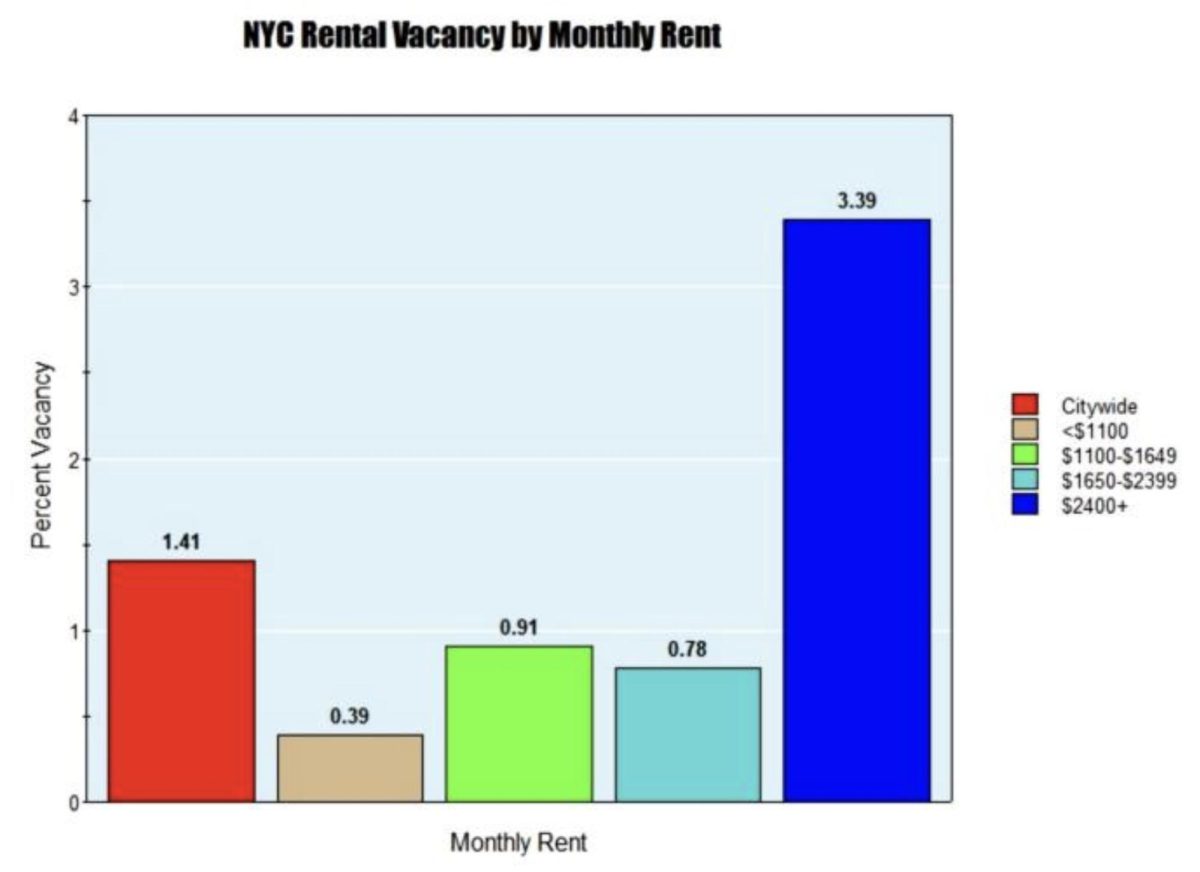At the beginning of February 2024, the New York City Department of Housing Preservation and Development announced a “multi-decade” low rental vacancy rate of 1.4%, one of the key findings from its 2023 Housing and Vacancy Survey. The survey is used to determine the need for rent control and stabilization.
According to the New York Times, housing experts consider a “healthy” vacancy rate to stand around 5 to 8 percent. The stark drop in the city’s rental vacancy rate brings further concern about the many problems that have plagued the New York City housing market, including high rents and a supply shortage.
Due to the decline in vacancy, there are less affordable housing opportunities available to residents, which are primarily representative of low-income families. The New York Times also reported on Feb. 8 that families who make about $70,000 per year, have to spend more than half of their income on rent. Only 1% of apartments in New York City cost about $1,650 per month – the citywide median, and 4% cost $2,400 per month.
“If they (unhoused people) could have a warm place to be, it could solve so many problems.”Joszef Balatoni, FCRH ’27
“The historic low vacancy rate from the 2023 Housing Vacancy Survey illustrates the pressures New Yorkers are facing in the housing market, and underscores the dramatic need for more homes in New York City, especially for lower income New Yorkers,” Maria Torres-Springer, Deputy Mayor for Housing, Economic Development and Workforce, said in a Feb. 8 press release from the city.
The lack of affordable housing means residents who can no longer afford an apartment are subject to vulnerable conditions, such as homelessness. This also applies to the influx of asylum seekers that are arriving to New York City — migrants in New York City Health + Hospital shelters are provided 30-day eviction notices for single arrivals and 60-day eviction notices for family arrivals since New York City Mayor Adams’ administration first handed out the notices in October 2023.
For Fordham University students who want to live off-campus, the median rent makes off-campus housing seem unattainable. According to CNN, the median rent in Manhattan fell to $4,000 in November 2023, down 4.6% from October and down 2.3% from a year ago, according to a monthly report from the brokerage firm Douglas Elliman and Miller Samuel Real Estate Appraisers and Consultants.
A report conducted by M.N.S Real Estate NYC stated the median rent in the other boroughs is $2,393 in the Bronx, $3,620 in Brooklyn and $2,781 in Queens. The data from the report did not note the median rent in Staten Island.
Students would have to decide between paying for room and board or renting an apartment in the city — room and board ranges from $18,820 to $32,212 depending on the occupancy in rooms per academic year, according to the Fordham University at Lincoln Center for the 2023-24 academic year, or rent, which can cost about $40,000, based on the current median rent in Manhattan, during the same time period.
Joszef Balatoni, Fordham College at Rose Hill (FCRH) ’27, said he wished he could live off-campus, but the cost of living is why he chose to commute from his home in Ossining, New York. Balatoni expressed that the only thing holding him back from moving out on his own, either on or off campus, is the cost.
“Overeager landlords are profiteering off of the shrinking middle class.”Lucas Roca, FCRH ’27
The cost of room and board would double for his family if he moved out, and this was not feasible. Balatoni shared that he would choose to live off campus to experience the sense of maturity and independence that comes with it if he had the opportunity. Overall, he believes the city’s housing shortage could be fixed, but it will continue to linger due to people’s greed.
“There are so many vacant apartments that could house so many people,” Balatoni said. “If they (unhoused people) could have a warm place to be, it could solve so many problems.”
Austin Aragon, Fordham College at Lincoln Center ’27, said he would rather live off-campus, but will stay in McMahon Hall next year due to the cost of rent in New York City. He wishes that the housing market in New York City could be less competitive and more affordable so that he could have a chance to live in an apartment with fewer roommates and more freedom. Aragon added that although living on campus is convenient, he believes living off campus would be so much better.
“Living off-campus, I would not have to follow some of the rules about visitors and stuff that I have to follow living on campus. I would also have less roommates, which would be nice,” Aragon said.
Lucas Roca, FCRH ’27, is originally from Manhattan and has chosen to stay on campus because the freedom of having his own space is extremely important to him. He wants to continue to live on campus next year, but in looking to the future, Roca definitely sees an issue with New York City housing that needs to be resolved.
He added that he believes the reasoning behind the extremely low vacancy rates is that “overeager landlords are profiteering off of the shrinking middle class,” and if this issue is not addressed the cost of living will become unbearable. Roca hopes the issue will be resolved, but believes that it is a “pipe dream.”
On Dec. 23, 2023, Mayor Adams signed into law the “Fair Housing Framework,” a housing law that would allow the creation of 100,000 new homes in all five boroughs through zoning changes. The hope, according to NYCC Speaker Adrienne Adams, is that the housing law will lay a “foundation for building and preserving housing, prioritizing affordability, and improving access to neighborhood investments and resources.”


